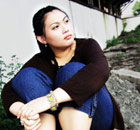Profiles
Country road leads to cure
By CHENG YINGQI (China Daily)
Updated: 2010-04-16 07:50
 |
Large Medium Small |
Retired professor embraces rural lifestyle, believes in magic of nature's healing power
BEIJING - The warm spring weather came later than usual this year. Yet while a small stream still flows below a thin layer of ice in a village 90 km from the center of Beijing, Cheng Enhua has already started to hoe the field again in his favorite coarse blue clothes and straw hat.
|
 Retired professor Cheng Enhua, who cured his terminal-stage rectal cancer living in the countryside, is seen at the Jingling Valley scenic area of Miyun county in suburban Beijing in August 2009. [Cao Jianguo] |
Everyone in Shuiquanyu village knows Cheng as the 75-year-old professor who moved from the city. Few know he was diagnosed with terminal-stage cancer 12 years ago.
Cheng, however, says he feels better than ever, and credits living in the countryside with renewing his life, and ridding his body of cancer.
"I'd been dreaming of a rural life for decades, but my work hampered me," Cheng says. "Cancer brought me the chance to start living all over again. I should thank the cancer."
In 1998, Cheng, then 64, was working night and day as a research specialist at the Ministry of Land and Resources. Although he sometimes felt unwell, he had no idea that he had rectal cancer.
"When I went to the hospital because I was passing blood, the doctor said, 'Why did you come so late?'" Cheng said.
"My heart missed a beat. But I calmed myself and asked him instead: 'I heard that rectal cancer doesn't spread. Does it?' He looked at me angrily and said, 'Who told you that?'"
"Then I knew I had cancer."
Out of the desire to survive, Cheng escaped from his home in downtown Beijing and moved to the village. Two years later, to the surprise of all the doctors, Cheng's cancer cells had disappeared.
"I believe that the power of nature can cure chronic diseases, so I stopped treatment after the surgery," he said.
Cheng had surgery during the Spring Festival of 1998. Although it was successful, the doctor said his cancer had spread to areas close to the rectum, so he had to undergo chemotherapy. But his wife Cao Jingyun was opposed.
"All the doctors said if Cheng had chemotherapy, he would have a 50 percent chance of surviving more than five years. If not, he would die in two years," his wife said.
After Cheng was diagnosed with cancer, Cao visited more than 20 people with rectal cancer. Discovering that everyone who had undergone chemotherapy suffered terrible pain, and the treatment wouldn't lead to a cure, Cao decided not to watch her husband suffer.
"In those days I wished it was me who had cancer, instead of him," Cao said. "I hoped that if he had to die, he would die with dignity, not thin and pale."
As Cao expected, Cheng refused chemotherapy, too.
"As long as I stay alive, I hope I can talk loudly, laugh heartily and go wherever I want. And I prefer death to moaning in bed," Cheng said. So he went to a place he had wanted to go nearly all his life - the countryside.
Between 1990 and 1998, Cheng and Cao visited villages in the outskirts of Beijing every weekend to choose a place to settle after retirement.
"There had to be mountains and water. We don't like plains. Also, the roads should be good enough so that our children can drive there to visit us on weekends. But there shouldn't be too many people as well," Cao said about the couple's crystal clear expectations. However, they couldn't find a perfect place until Cheng became ill.
Besides the love of nature, Cheng had another reason why he loved rural life - he believed in the magic of nature.
Cheng remembers a story he heard as a teenager. In the late 1940s, an old man was diagnosed with tuberculosis, an incurable infectious disease at that time. Since he didn't want to infect his family, he moved to a remote lake to spend the last days of his life quietly and enjoy his favorite pastime - fishing. However, half a year passed and the old man felt better than before. He returned to the hospital and was surprised to find he had been healed.
Putting his hopes on rural life, Cheng and Cao moved into Shui Quanyu village taking only a quilt, some clothes and a pot. At that time, the village had no hospital, no shopping mall, no TV sets, no gas ovens or showers.
Despite the inconvenience, Cheng enjoyed their new life.
Every morning the first thing Cheng does is exercise along the riverbank. He paces back and forth, takes two deep breaths and exhales, murmuring "breath in, breath in, breath out "
Cheng said there are 20 times more germ-killing negative oxygen ions along the river than in the city.
Besides exercise, Cheng likes farming best. He plants more than 20 kinds of vegetables in his 200 square-meter field and uses sewage to replace fertilizer.
Unlike other people who have digestive system diseases, Cheng eats big meals every day. A regular breakfast can consist of soybeans, an egg, a bowl of congee, corn, sweet potato, meat and two kinds of fruit.
"I am not eating luxurious dishes without nutrition. But I am trying to keep my diet diversified with fresh vegetables and cereals that can provide me with all kinds of nourishing ingredients," Cheng said.
Every three days, he walks 2.5 kilometers to the head of Lingquan, a small mountain stream, to carry back 20 liters of water. With a background in geology, Cheng recognized that the water has a high mineral content.
In the mountains, Cheng was happy to find that he could sing loudly without disturbing the neighbors.
"I have not been here for a long time. The fresh water flows across mossy ground. I blow the moss to drink the water. The sounds of singing linger all around," his folk song rings out across the valley.
Cheng doesn't force himself into regular hours. He may have lunch at 4 pm, or go to bed at 5 pm.
"Live in a simple house, eat simple foods and keep simple relationships with local people, " Cheng says. "That's the very kind of lifestyle that goes well with nature."
CHINA DAILY







